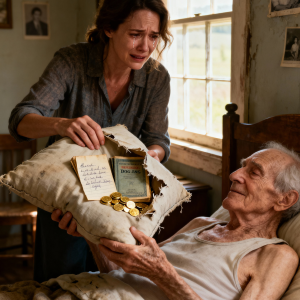
In the small town of Riverton, stories often grew larger than life, but none ever surpassed the tale of Anna Carter, the widow who faced death with nothing but prayer on her lips.
It began quietly, years before that dreadful night beneath the oak tree. Anna was known as a seamstress, a woman who lived simply after the death of her husband Samuel in a mining accident. For a time, she drifted through her days like a shadow, carrying grief so heavy that even her neighbors spoke in hushed tones when she passed. Then, one morning, she sat in the marketplace with her husband’s old Bible open on her lap. Her voice trembled at first, but she read aloud.
“Love your enemies, and pray for those who persecute you.”
Some merchants smirked. A farmer muttered, “The poor woman has lost her mind.” Yet a weary miner paused and listened. He later confessed, “Her words made me feel like I was breathing clean air after years underground.” That miner returned, and soon others followed. Anna never demanded attention; she simply spoke with quiet conviction.
But her growing influence unsettled Jonas Hale, the town’s preacher. From his pulpit he warned, “Beware false teachers. This woman twists the Word to suit herself.” His voice echoed through Riverton’s church, and suspicion spread like fire.
One night, as the moon hung low, a mob gathered. Torches burned, voices roared, and someone shouted, “Bring her out!” They dragged Anna to the great oak in the town square. Her frail body seemed lost in the sea of angry faces. Jonas Hale stood at the front, his hand resting on a heavy Bible, his eyes hard.
“Anna Carter,” he declared, “you have led this town astray. What do you say for yourself?”
Anna’s voice was steady, though the rope already brushed her neck. “I say only this: Father, forgive them, for they know not what they do.”
The crowd jeered. A young man threw a stone that grazed her arm. Yet she did not flinch. Her lips moved in prayer, and some who stood close heard her whisper, “Lord, let not their sin be counted against them.”
Then came the moment. The rope tightened. Silence fell, broken only by the creak of wood and the ragged breaths of those watching. Suddenly, a sound rose from beyond the square—the sharp rhythm of hooves, though no horse could be seen on the ground. The sound grew louder until out of the night appeared a stallion white as snow, its mane flowing with light.

Gasps swept the crowd. A woman clutched her child and cried, “It walks on air!”
The shining horse moved as though the earth itself bowed beneath it. With a single toss of its head, the rope around Anna snapped clean apart. She fell forward but landed gently across the horse’s back. Her eyes opened wide, and her voice rang out with new strength.
“As I have been forgiven, I forgive you all.”
The mob froze. Some covered their faces in shame. Jonas Hale staggered backward, his Bible slipping from his hand. “This cannot be…” he whispered, but his voice broke. The horse carried Anna a short distance before lowering her softly to the ground. Then, as if it had never been, it vanished into the night, leaving only the echo of hooves in the air.
From that night forward, Riverton changed. Theft and violence dwindled until they were nearly forgotten. Workers treated one another with dignity. Shopkeepers dealt honestly, and families once divided by bitterness found ways to reconcile. Even Jonas Hale, after many sleepless nights, came to Anna with tears streaming down his face.
“I despised you,” he admitted. “Can you forgive me?”
Anna touched his arm and answered, “I forgave you long before you asked.”
She lived twelve more years, becoming “Grandma Carter” to children and adults alike. She taught not with sermons but with small acts of kindness—sharing bread with the hungry, sitting beside the lonely, listening when others had no one to confide in.
When at last she reached the end of her days, eighty-six years old, her room was filled with neighbors. As the morning light streamed in, she smiled faintly and said, “Do you hear it? The horse has come for me.” Witnesses later swore they heard hooves in the air, and a glow filled the room. Anna’s breath slowed, then stopped, leaving only peace on her face.
Her funeral drew thousands, and the old oak became a place of remembrance. At its base, the townspeople set a plaque inscribed with her words: “As I was forgiven, so I forgive.” Generations later, elders would still tell children, “On quiet nights, if you listen closely, you can hear the horse’s hooves.”
And the children would ask, “Was it real?”
The elders would smile and say, “The miracle was real, yes. But the greater miracle was Anna’s heart.”



